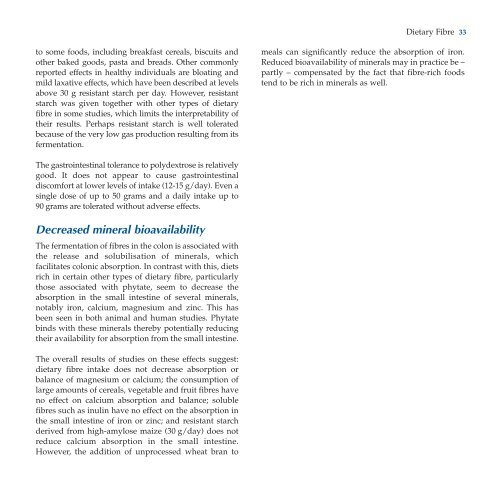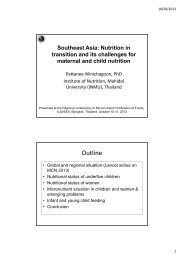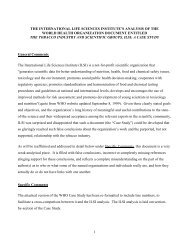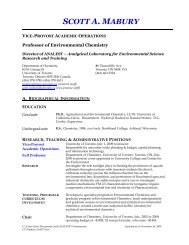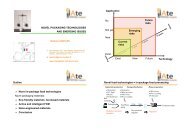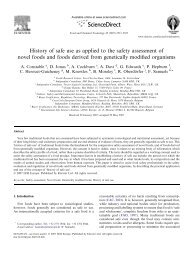Dietary Fibre - ILSI Argentina
Dietary Fibre - ILSI Argentina
Dietary Fibre - ILSI Argentina
You also want an ePaper? Increase the reach of your titles
YUMPU automatically turns print PDFs into web optimized ePapers that Google loves.
<strong>Dietary</strong> <strong>Fibre</strong> 33<br />
to some foods, including breakfast cereals, biscuits and<br />
other baked goods, pasta and breads. Other commonly<br />
reported effects in healthy individuals are bloating and<br />
mild laxative effects, which have been described at levels<br />
above 30 g resistant starch per day. However, resistant<br />
starch was given together with other types of dietary<br />
fibre in some studies, which limits the interpretability of<br />
their results. Perhaps resistant starch is well tolerated<br />
because of the very low gas production resulting from its<br />
fermentation.<br />
meals can significantly reduce the absorption of iron.<br />
Reduced bioavailability of minerals may in practice be –<br />
partly – compensated by the fact that fibre-rich foods<br />
tend to be rich in minerals as well.<br />
The gastrointestinal tolerance to polydextrose is relatively<br />
good. It does not appear to cause gastrointestinal<br />
discomfort at lower levels of intake (12-15 g/day). Even a<br />
single dose of up to 50 grams and a daily intake up to<br />
90 grams are tolerated without adverse effects.<br />
Decreased mineral bioavailability<br />
The fermentation of fibres in the colon is associated with<br />
the release and solubilisation of minerals, which<br />
facilitates colonic absorption. In contrast with this, diets<br />
rich in certain other types of dietary fibre, particularly<br />
those associated with phytate, seem to decrease the<br />
absorption in the small intestine of several minerals,<br />
notably iron, calcium, magnesium and zinc. This has<br />
been seen in both animal and human studies. Phytate<br />
binds with these minerals thereby potentially reducing<br />
their availability for absorption from the small intestine.<br />
The overall results of studies on these effects suggest:<br />
dietary fibre intake does not decrease absorption or<br />
balance of magnesium or calcium; the consumption of<br />
large amounts of cereals, vegetable and fruit fibres have<br />
no effect on calcium absorption and balance; soluble<br />
fibres such as inulin have no effect on the absorption in<br />
the small intestine of iron or zinc; and resistant starch<br />
derived from high-amylose maize (30 g/day) does not<br />
reduce calcium absorption in the small intestine.<br />
However, the addition of unprocessed wheat bran to


